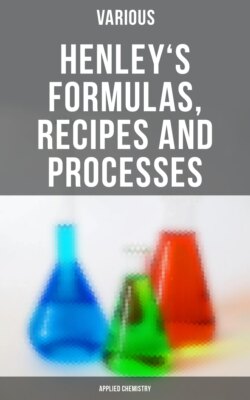Читать книгу Henley's Formulas, Recipes and Processes (Applied Chemistry) - Various - Страница 287
На сайте Литреса книга снята с продажи.
Type Metal.
Оглавление—An alloy which is to serve for type metal must be readily cast, fill out the molds sharply, and be as hard as possible. It is difficult to satisfy all these requirements, but an alloy of antimony and lead answers the purpose best. At the present day there are a great many formulas for type metal in which other metals besides lead and antimony are used, either to make the alloy more readily fusible, as in the case of additions of bismuth, or to give it greater power of resistance, the latter being of especial importance for types that are subjected to constant use. Copper and iron have been recommended for this purpose, but the fusibility of the alloys is greatly impaired by these, and the manufacture of the types is consequently more difficult than with an alloy of lead and antimony alone. In the following table some alloys suitable for casting type are given:
| Lead | Antimony | Copper | Bismuth | Zinc | Tin | Nickel | |
|---|---|---|---|---|---|---|---|
| I | 3 | 1 | — | — | — | — | — |
| II | 5 | 1 | — | — | — | — | — |
| III | 10 | 1 | — | — | — | — | — |
| IV | 10 | 2 | — | 1 | — | — | — |
| V | 70 | 18 | 2 | — | — | 10 | — |
| VI | 60 | 20 | — | — | — | 20 | — |
| VII | 55 | 25 | — | — | — | 20 | — |
| VIII | 55 | 30 | — | — | — | 15 | — |
| IX | 100 | 30 | 8 | 2 | — | 20 | 8 |
| X | 6 | — | 4 | — | 90 | — | — |
The French and English types contain a certain amount of tin, as shown by the following analyses:
| English Types | French Types | |||
|---|---|---|---|---|
| I | II | III | ||
| Lead | 69.2 | 61.3 | 55.0 | 55 |
| Antimony | 19.5 | 18.8 | 22.7 | 30 |
| Tin | 9.1 | 20.2 | 22.1 | 15 |
| Copper | 1.7 | — | — | — |
Ledebur gives the composition of type metal as follows:
| I | II | III | IV | |
|---|---|---|---|---|
| Lead | 75 | 60 | 80 | 82 |
| Antimony | 23 | 25 | 20 | 14.8 |
| Tin | 22 | 15 | — | 3.2 |
WATCHMAKERS’ ALLOYS: See Watchmakers’ Formulas.
